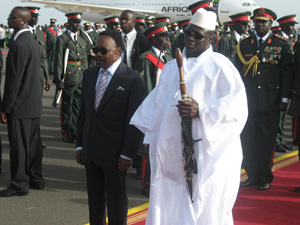
A July report by international human rights organization, Observatory for the Protection of Human Rights Defenders, pointed to repression of journalists and civil society, through “prolonged trials… on baseless charges” and “unlawful arrests, arbitrary detention and prosecution”. The report noted concern that cases like these could increase as the elections approach.
Amnesty International’s Gambia campaigner, Ayodele Ameen, told IRIN: “We have serious concerns about observance of human rights during the elections.” Ameen, who was arrested and detained for two days in 2007 while doing research for Amnesty in Gambia, said: “If you have a climate of fear, you have a situation where people cannot speak freely, and cannot participate freely in elections.”
Opposition parties are concerned the shortened campaign period, set for 10-21 November, will disadvantage them.
“The 11-day campaign timetable declared by the electoral body is too short and does not favour the opposition parties,” Henry Gomez, leader of opposition Gambia Democratic Party, told reporters. Omar Jallow, leader of the opposition Progressive People’s Party, agreed, telling reporters the campaign period was “too short” and “inadequate” for effective campaigning.
Opposition parties have petitioned against the campaign timetable, but were still waiting for a response from the Independent Electoral Commission (IEC) on 29 August.
Handpicked judiciary
Bai,* a concerned citizen, pointed to other ways the elections were skewed. He said manipulation takes place behind the scenes – through a judiciary handpicked by President Yahya Jammeh, which helps quash the media and opposition, and through government-appointed local leaders under pressure to support the incumbent.
Bai said government influence over the judiciary means the courts can be used to silence opposition. He pointed to recent judicial decisions including treason charges in June against Amadou Scattred Janneh, a former government minister, and three other men for distributing T-shirts demanding “End to Dictatorship Now”. Last year, Femi Peters, a member of an opposition party, was jailed for one year for organizing a rally and holding a microphone without permission.
“[President Jammeh] appoints and dismisses judges at will, including the chief justice… All the judges who try to be fair-minded and impartial are dismissed,” Bai said.
This was supported by the Observatory report which found “extensive political interference” in the judiciary and “several occasions [where] the president has illegally removed judges whom he perceived as dissenting voices”.
Media control
While opposition parties officially have access to the media during the designated campaign period, the last presidential election, in 2006, saw a high level of bias and self-censorship from the media.
Bai said he knew of a reporter who was sacked after giving positive coverage to an opposition rally during the campaign period in 2006. The coverage – which described the rally as “well attended” – was considered too favorable. “Management asked why he would say that,” Bai said.
A report on the 2006 elections published on the Electoral Knowledge website said even during the campaign period Gambia Radio-Television Services – the main source of news outside the capital – “showed an overwhelming bias in favour of the ruling party”.
“The level of illiteracy is high, so most people depend on the radio for information,” Bai said. “National radio is the only radio station allowed to broadcast news in Gambia.”
Gambia is described as “one of the most repressive countries for journalists in Africa” by the Committee to Protect Journalists (CPJ), with three independent radio stations banned and the National Intelligence Agency (NIA) involved in extrajudicial detentions and torture of journalists.
Local leaders under pressure
District and village heads have been accused of caving in to pressure to support President Jammeh in previous elections, and citizens and opposition leaders have voiced concern this pattern will continue. Constitutionally, district and village heads are expected to be politically neutral and are barred from active party politics.
Shyngle Nyassi of the opposition United Democratic Party, told IRIN: “Our traditional leaders are not only loyal to the ruling party, but are political activists who do all they can to deliver their people to the ruling party to avoid sacking.”
Bai supported this, saying the government-appointed village and district heads could be sacked without explanation. “If a village or a district head [is] not effective in campaigning for the ruling party they will be dismissed.”
These leaders wield significant influence in their communities, he said. “Through this [President Jammeh] can win a lot of votes and can appear popular.”
A district head, who preferred anonymity, denied this, saying he had never received instructions to campaign for the ruling party. He admitted to campaigning for the ruling party, but said he did so of his own volition.
Last year district heads led a failed campaign to crown President Jammeh King of Gambia.
Amat*, a concerned Gambia citizen who also preferred anonymity, said the population was closely monitored for dissent, with people living in “terrible fear” of arrest and other consequences. “You can be taken and no one will testify that you were taken and you can be kept as long as they want,” he said. “There are so many NIA [officers] all over the place… You have to watch every move you make that it does not offend.”
Human rights abuses are widely documented and include reports by Amnesty International of enforced disappearances, extrajudicial executions and the torture of journalists, opposition party members and peaceful protesters.
*not a real name
IRIN News
wb/contributor/np/cb
Theme (s): Governance, Human Rights,
[This report does not necessarily reflect the views of the United Nations]
